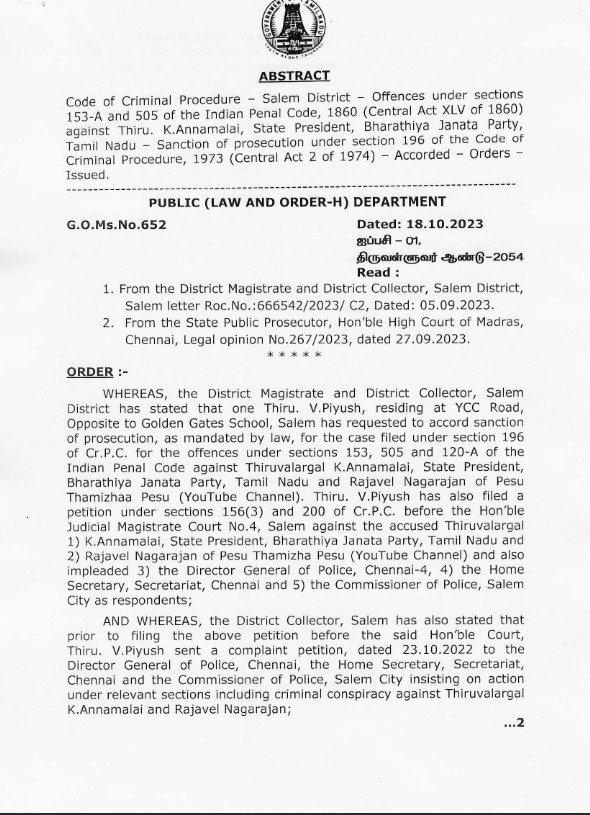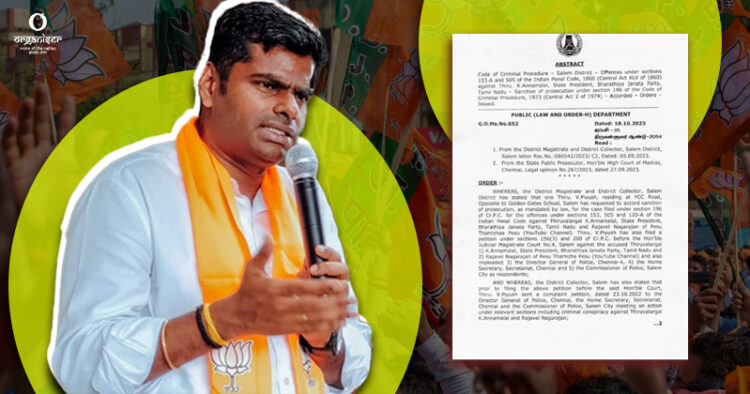K Annamalai, who serves as the chief of the Tamil Nadu BJP, has emerged as a formidable opposition leader, often keeping the ruling party and its allies on edge with his relentless critique of their actions. He has not shied away from highlighting issues such as government excess, corruption, commissions, and policies that are detrimental to the public interest, including rising electricity charges, property taxes, and milk prices. Annamalai even made waves by releasing DMK files 1 and 2, hinting at a forthcoming release of part 3.
A four-member team appointed by BJP National President JP Nadda is currently in Tamil Nadu to investigate the alleged targeting of BJP and Sangh Parivar members for their social media posts and the continuing practise of midnight arrests by the police. The panel is expected to meet with Tamil Nadu Governor RN Ravi to submit their findings. Annamalai recently stated that they had prepared a detailed report documenting cases filed by the DMK over the past three years with FIR copies, their current status, the sections most frequently invoked, the application of the Goondas Act, and the pattern of Friday arrests to prevent bail.
Annamalai’s Popular Statewide Yatra
Annamalai’s statewide yatra has garnered tremendous support from the public, particularly from youngsters, women, and senior citizens. His eloquent speeches and adept handling of the media, often perceived as pro-DMK, have won him accolades. The DMK government appears envious of his yatra’s success, and to disrupt his momentum, they recently arrested one of the yatra’s organisers, Amar Parasad Reddy, and filed four cases against him, with speculation of the Goondas Act being invoked.
The MK Stalin-led DMK government has a history of threats against Annamalai, warning of potential arrest for hate speech and critical comments against the DMK government and its leaders. In this context, the Tamil Nadu government has granted its sanction for a hate speech case against Annamalai, related to his alleged comments against a Christian NGO.
Details of the Hate Speech Case
The police department issued a Government Order (GO MS. 652) in the gazette on October 18, referencing a complaint from one V. Piyush in Salem. Piyush sought sanction to prosecute Annamalai and Rajavel Nagarajan, a YouTuber, for offences punishable under sections 153 (intention to cause a riot), 505 (promoting enmity between two religions), and 120A (criminal conspiracy). Piyush also filed petitions under sections 156(3) and 200 of the Criminal Procedure Code (Cr.P.C) against the accused Annamalai and Rajavel Nagarajan, involving the Director General of Police, Home Secretary, and the Commissioner of Police, Salem City, as respondents.

In a recent development, the Tamil Nadu government has given its approval for initiating a hate speech case against K. Annamalai, the state’s BJP chief. The decision comes after a complaint was filed by V Piyush from Salem, who insisted on action against Annamalai and Rajavel Nagarajan, a YouTuber, under relevant sections of the law, including criminal conspiracy.
The Government Order (GO) issued on October 18, 2022, comes in the wake of an opinion sought from the State Public Prosecutor, who determined that Annamalai’s remarks regarding a Christian Missionary NGO were made intentionally and out of context, prompting the NGO to petition the Supreme Court. The prosecutor cited that Annamalai’s speech contained words and phrases generally considered offensive to a particular religion and society. According to the prosecutor, Annamalai’s speech falls within the definition of “hate speech” as defined in the Amish Devgan Vs. Union of India and others (2021) 1 SCC.
The State Public Prosecutor also referenced a directive from the Hon’ble Supreme Court of India, stating that states should take suo motu action to register cases related to hate speeches under various sections of the Indian Penal Code (IPC), even in the absence of complaints. Offenders should be prosecuted under the law.
Charges and Government’s Decision
The GO affirmed that Annamalai’s statements were intended to cause fear, alarm, and create hatred or enmity between two religions. The government, based on the State Public Prosecutor’s opinion, deemed this a fit case to grant prosecution sanction against Annamalai. The offenses in question are punishable under sections 196 of the Code of Criminal Procedure (CrPC), invoking the relevant provisions of 120-A, 153, 153A, and 505 of the IPC.
Consequently, the Tamil Nadu Governor has officially accorded sanction for the prosecution of Annamalai for the offenses under sections 153-A and 505 of the IPC, to be taken cognizance of by a court of competent jurisdiction. The government order was issued by K Nanthakumar, Secretary to the Government.
In response to this decision, political commentator Priya Venkat raised concerns about a double standard in handling hate speech cases. Venkat pointed out that there have been numerous complaints against DMK spokespersons, ministers, Chief Minister Stalin, and its allies, as well as various leaders and YouTubers who have allegedly made abusive and obscene comments targeting Hinduism, Hindu gods, PM Modi, Home Minister Amit Shah, and other Sangh Parivar figures. Many of these complaints have yet to see any action, gathering dust at police stations. Venkat highlighted the need for a fair and consistent approach to such cases.
The Tamil Nadu BJP is yet to issue a response to the government’s GO, leaving room for further developments and reactions in this ongoing controversy.




















Comments